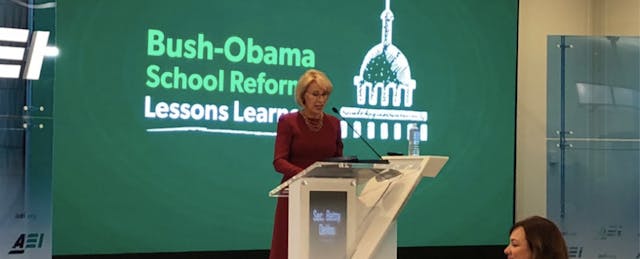U.S. Education Secretary spared no words in her critique of education reform efforts during the Bush and Obama administrations. “I don’t think there is much we can hold onto, from a federal level, that we can say was a real success,” she said at a Jan. 16 event organized by the American Enterprise Institute, a conservative public policy think tank.
Yet where she sees “promise” are movements to improve education at the classroom level, particularly through instructional approaches now often referred to as “personalized learning.”
“We need to allow for individualization and customization, and I think a lot of the tasks and trends around personalized and customized learning are really promising,” DeVos told the crowd. “I am very hopeful that more schools go in that direction.”
This is not the first time DeVos has praised personalized learning. The education secretary visited Thomas Russell Middle School in Milpitas, Calif., a school using a technology-enhanced personalized learning model, during her ReThink Education tour last October. During the visit, she lauded the possibilities that technology could play in the education space, something she repeated at today’s event.

When asked by EdSurge for specific examples of places where she saw promise in the personalized learning movement, DeVos said: “My observations have only been snapshots. What I have observed and also read from others who are more deeply immersed in this, is that students that are in that setting are able to really pursue their learning and take charge and control of their own learning and to proceed at a rate that works for them.”
DeVos pointed to the ability of students to move through subjects at their own pace. She also noted the potential to disrupt traditional educational practices, such as how students are grouped by age.
“I think about my oldest granddaughter who is six, and she is in first grade in a school that is very innovative, student-led and directed,” DeVos explained. “I am optimistic that the places where this customized, personalized approach has been tested and shown to be successful for students, that there is going to be a broader embrace of it. But it does require significant change on the part of educators and also administrators. I acknowledge that change is hard, but we have to do it.”
Her vision of personalized learning has plenty of detractors. Educators and administrators have already begun to voice their reservations about personalized learning in schools. At a gathering of educators in Oakland last October speakers decried what they described as the privatization of public education through the introduction of technology initiatives such as personalized learning. More recently, former AltSchool educator Paul Emerich wrote a blog post titled, “Why I Left Silicon Valley, EdTech, and ‘Personalized’ Learning,” where he offered critiques of the personalized learning movement in his school. The post touched on concerns about his workload and interactions with students.
“The workload was immense and unsustainable, and even when I felt like I was doing what we set out to do–curate educational playlists of cards that were specifically chosen for them–I didn’t feel like it was entirely effective,” writes Emerich. “It was isolating, with every child working on something different.”
Parents are raising pressure too. In at least two states, their concerns over screen-time and digital content used in online educational platform has forced districts to suspend the implementation of technology-enabled personalized learning programs such as Summit Learning.
Despite her verbal enthusiasm for personalized learning, DeVos indicated that it is unlikely that her department will offer direct funding to incentivize schools to get onboard. She pointed to previous federal-led education funding programs as a “carrot” that made little or no impact. Her critique is not unfounded: A report published last year by the Education Department’s research division found that the $7 billion School Improvement Grants program made “no significant impacts” on test scores, high school graduation rates or college enrollment.
“The Obama administration dangled billions of dollars through the “Race to the Top” competition, and the grant-making process not so subtly encouraged states to adopt the Common Core State Standards,” said DeVos in her opening speech to the crowd. “Then, rightly, came the public backlash to federally imposed tests and the Common Core. I agree—and have always agreed—with President Trump on this: ‘Common Core is a disaster.’ And at the U.S. Department of Education, Common Core is dead.”
Common Core is currently adopted in 36 states, according to EdWeek’s Common Core Tracker, last updated September 2017.


